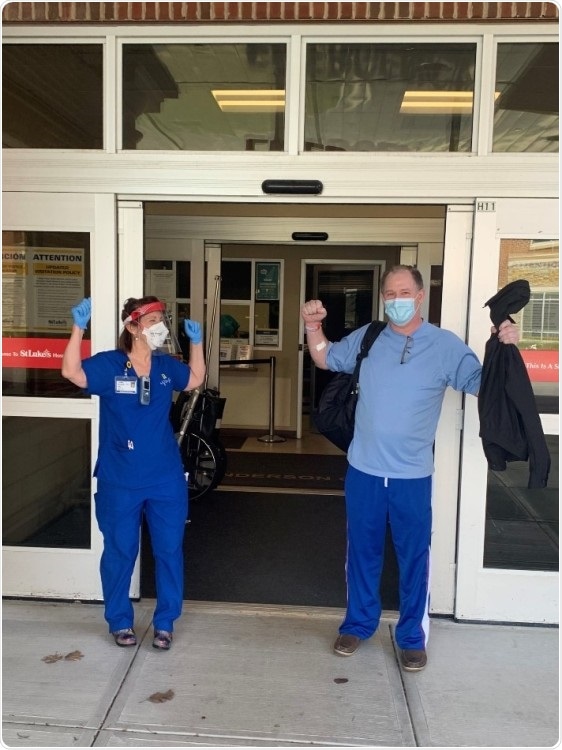St. Luke’s Anderson Campus discharged its 100th COVID-19 patient Wednesday. The Anderson Campus in Bethlehem Township is one of the Network’s 11 hospitals.

Nurse Rita Gencarelli and patient Curtis Ding.
Curtis Ding of Forks Township, the 100th patient, spent 10 days at the Anderson Campus. He started his journey on the medical/surgical unit, and after a few days he was transferred to the ICU. He remembers the fear of knowing he was going into the ICU. When it was clear that he might have to be intubated, he called his parents to say goodbye. He knew there was a chance he would never see them again. He was not able to call his 16-year-old son to say goodbye – the idea of not seeing his son again or not seeing him graduate was too overwhelming. At that time, he said to his care team that he would do anything to avoid being intubated. The members of his care team encouraged him to do special breathing exercises and spend time in the prone position.
Ding was scared but motivated by a desire to live and see his family. Despite his discomfort, he continued to push himself, and the unique protocols St. Luke’s has developed since the start of the COVID-19 crisis proved successful: Ding left the ICU without being intubated and returned to the medical/surgical unit to recover.
I am grateful for the care I receive during my stay at St. Luke's Andersen Campus, and I truly credit the staff for saving my life. I specifically want to thank Rita Gencarelli, my final nurse… I wish I could've given her a hug as I was being discharged. Rita was a godsend to me. All staff were excellent and were all truly instrumental in helping me heal to where I could be released and complete my recovery at home. I will forever be grateful.”
Curtis Ding
Across the Network, St. Luke’s has discharged about 450 COVID-19 patients who are now recovered or on the road to recovery.
Among the discharged patients are many who were on ventilators. Network-wide, St. Luke’s has extubated about 50 patients thus far.
“These remarkable figures reflect the incredible, lifesaving care that our doctors, nurses and other caregivers are providing our community, and the incredible innovations St. Luke’s has implemented to meet the unique challenges presented by COVID-19,” said infectious disease specialist Jeffrey Jahre, MD, St. Luke’s Senior Vice President of Medical Affairs.
Deborah Stahlnecker, DO, of St. Luke’s Pulmonary and Critical Care Associates and Medical Director of the Anderson Campus ICU said her team has been working tirelessly to provide the best care possible for our COVID-19 patients, and it’s paying off.
We developed a comprehensive medication protocol based on the best evidence available that includes hydroxychloroquine, high dose vitamin C, zinc, atorvastatin and steroids. We also utilize non-invasive techniques such as high-flow nasal cannula and self-proning maneuvers, where patients spends up to 12 hours a day lying on their stomachs to help distribute oxygen more effectively in the lungs. Many of these measures were used to help Mr. Ding and others recover from COVID-19 across the St. Luke’s Network.”
Deborah Stahlnecker, DO, of St. Luke’s Pulmonary and Critical Care Associates and Medical Director of the Anderson Campus ICU
Among St. Luke’s other innovations: The Network is one of the first institutions worldwide to use Masimo SafetyNet. Masimo SafetyNet uses a tetherless, single-patient-use sensor to monitor patients’ vital signs and provide doctors with valuable clinical data that helps to inform difficult treatment decisions such as when to use a ventilator.
“This technology is incredibly helpful in light of the crush of demand on our hospitals during this COVID-19 pandemic,” Aldo Carmona, MD, St. Lukeʼs Senior Vice President of Clinical Innovation and Chairman of the Department of Anesthesia and Critical Care, said.